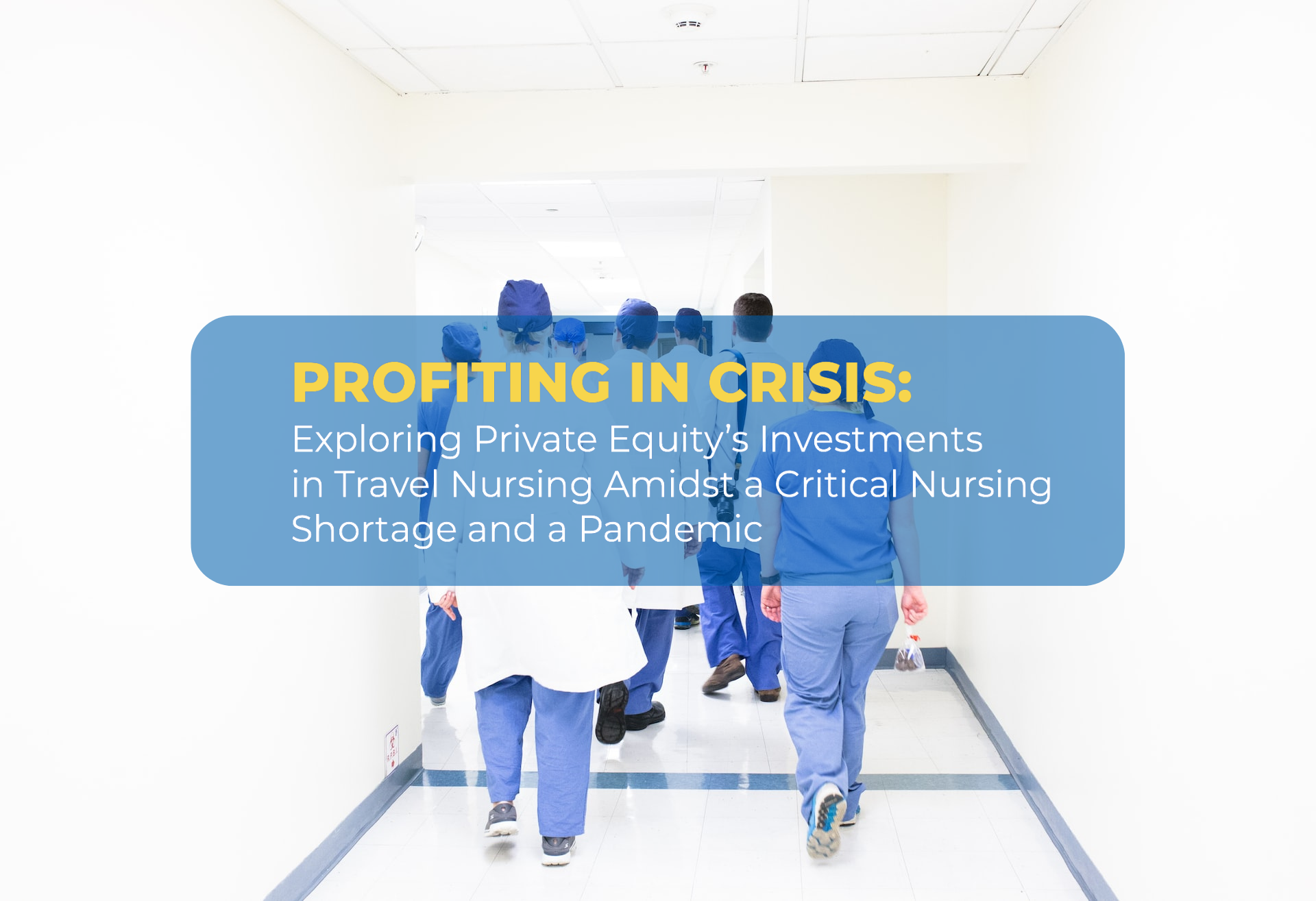
Profiting in Crisis: Exploring Private Equity’s Investments in Travel Nursing Amidst a Critical Nursing Shortage and a Pandemic
October 12, 2022
With the uptick in travel nursing since the beginning of the pandemic, there have been record levels of private equity activity in the medical staffing space. With this in mind, PESP healthcare researcher Mary Bugbee authored a new report that examines the nurse staffing crisis, the travel nursing industry, and the increased investment in medical staffing we’re seeing with private equity.
Profiting in Crisis: Exploring Private Equity’s Investments in Travel Nursing Amidst a Critical Nursing Shortage and a Pandemic
The report highlights nursing shortages, the unprecedented rate hikes for travel nurses and the associated skyrocketing labor costs faced by hospitals, and the opportunistic influx of private equity into the medical staffing industry during a health crisis. It also calls attention to how the under-regulated, for-profit health system in the United States has substantial vulnerabilities, especially so during a pandemic.
Key points from the report:
- There is currently a staffing crisis in U.S. nursing.
- Many nurses and their advocates maintain that the staffing crisis was created by the hospital industry and that it precedes the COVID-19 pandemic. They argue that the pandemic did not cause nursing burnout and unsafe staffing conditions, but rather has exacerbated these pre-existing problems arising from hospital profit-seeking.
- Travel nursing companies (private equity- and non-private equity-owned alike) and the large influx of COVID-19 funding for hospitals have disrupted healthcare labor markets. Many nurses are leaving permanent positions at their local hospitals to make substantially higher wages as a travel nurse. Hospitals have been able to pay inflated rates to travel nurse agencies in part because of pandemic relief funds from the government. In many hospitals, staff nurses are working alongside travel nurses who make higher hourly wages than them.
- Since early 2022, COVID-19 relief funds have been drying up and there are less lucrative opportunities for both travel nurses and travel nursing agencies. Many travel nurses are reporting cancelled assignments and reduced wages mid-assignment, as well as experiencing issues with both the travel agency they are contracted with as well as the hospitals they are being assigned to. One law firm is investigating 35 travel nurse agencies in a potential class-action lawsuit.
- Amidst the staffing crisis impacting patient care around the nation, private equity’s increased activity in the travel nursing sector is cause for concern.
- Private equity firms were investing in travel nursing and other types of medical staffing companies prior to the COVID-19 pandemic. As a fragmented industry with considerable opportunities for consolidation, this sector has been attractive to private equity. Further, an aging population and long-term projected shortage of nurses to meet the needs of this population has also attracted investors.
- However, as the need for travel nurses skyrocketed during the COVID-19 pandemic, (and federal and state COVID-19 relief funds became available to cover increased staffing costs), there was increased private equity activity in the travel nursing/medical staffing sector. 2021 saw record levels of private equity activity in the medical staffing space.
- Travel nursing and other types of medical staffing companies are also investing in AI/software platforms that offer workforce solutions to providers.
- Some private equity-owned agencies are saddled with debt and/or owned by investors who are do not have a history of investing in the healthcare sector.
- The travel nursing industry has been accused of price gouging by various policymakers and the hospital industry, who have called on the Federal Trade Commission (FTC) and other federal and state agencies to investigate. The federal government has not commented on whether an investigation is occurring.
- The nursing shortages at hospitals, rate hikes for travel nurses, and the associated skyrocketing labor costs illustrate how the underregulated for-profit health system in the United States has substantial vulnerabilities, especially so during the pandemic, and that current regulations and enforcement of those regulations have been insufficient to contain costs and address the acute labor shortage successfully.
Download the full report here.

